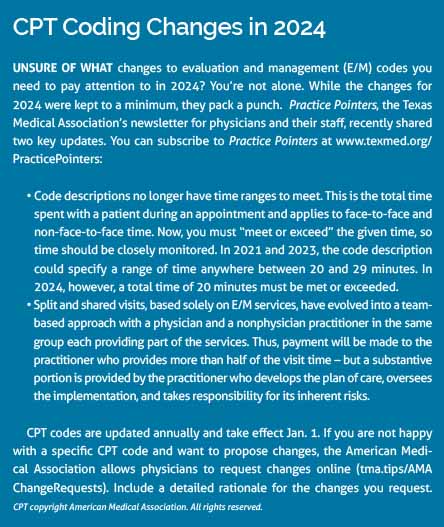
Galveston family physician Samuel Mathis, MD, says the addition of a new Medicare code that provides more accurate payment for complex visits is “a long-awaited change.”
The 2024 Medicare physician fee schedule allows physicians to list G2211 in addition to codes used in office or outpatient visits for new or established patients (i.e., 99202-99215). Physicians also can use it for telehealth visits.
Initially proposed in 2021 by the Centers for Medicare & Medicaid Services (CMS), the code’s 2024 implementation includes several changes for which the Texas Medical Association advocated:
- More clarification from CMS on when physicians can use the code;
- Assurances that physicians will be paid appropriately for time spent caring for patients regardless of delivery type; and
- Office visit rate increases applied uniformly across all services and specialties.
However, TMA continues to push for additional coding guidance as physicians frequently find the code’s use confusing at first.
“The code is meant to highlight the depth and complexity of a visit that takes on continuity of care, and how the care that I provide must, in that continuity, consider all of the nuances of this patient and how any change made during an appointment creates a significant domino effect of care,” Dr. Mathis said.
“For example, consider a cardiologist in West Texas who also refills patient prescriptions, takes care of a patient’s blood pressure, and occasionally also treats standard acute bacterial bronchitis or sinusitis. That doctor must provide some care that is outside of the norm of what their specialty entails. And that’s where this new code can come in handy.”
However, the final rule prohibits physicians from combining the G-codes with modifier 25, used when physicians perform a procedure and provide another service on the same day as an office or outpatient evaluation.
Gary Sheppard, MD, Houston internist and chair of TMA’s Council on Socioeconomics, worries that, without that ability, patients will be forced to wait for necessary care while physicians try to fit multiple appointments into their busy schedules.
“The modifier allows us to do two things [in] one visit and still get paid for the work we do. It’s easier for both the patient and the doctor,” he said. “Without the modifier, a patient will need to come in for a separate visit for one service, like a physical, that may not address their chronic problems, and then schedule another visit to address more specific concerns. This doesn’t make sense. Why should they have to come in twice?”
Dr. Sheppard also says clearer communication from CMS on how to use the code is still needed. Until then, he worries physicians will avoid using G2211 to avoid possible denials.
However, he remains hopeful that the code will recompense physicians for extra work required for the coordination of care for patients with complex or serious conditions.
“The idea behind the code is to help physicians receive payment for extra time and manpower that you expend when you see more complicated patients, and that’s a good thing,” Dr. Sheppard said. “I’m still hopeful that G2211 will provide a better pathway for physicians to receive payment, and [TMA will] continue to work to see to that end.”

Alisa Pierce
Reporter, Division of Communications and Marketing
(512) 370-1469